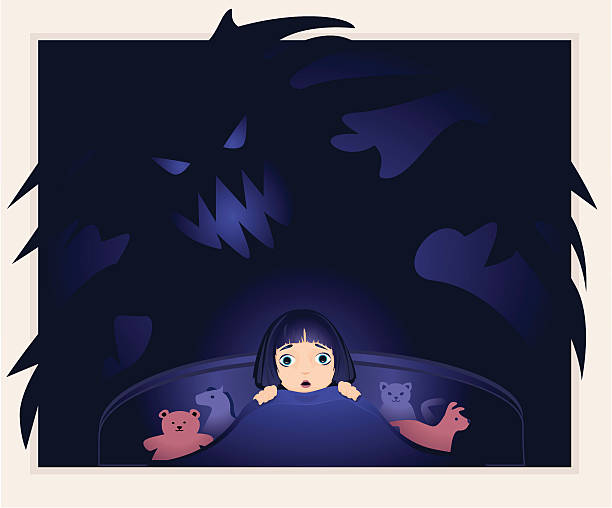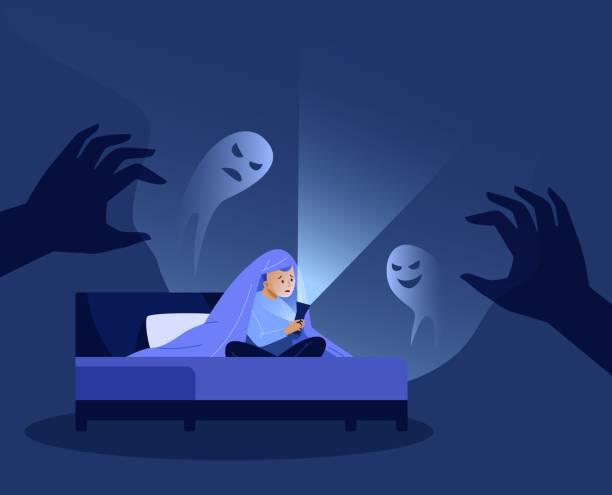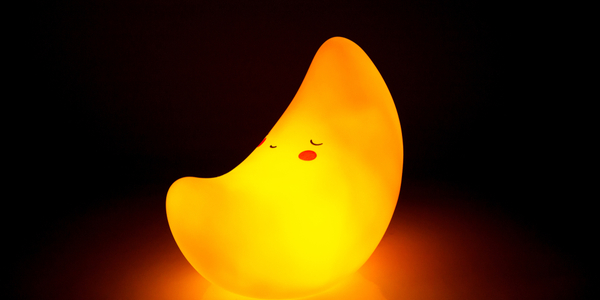Halloween is all about spooky fun, but for some children, the frights don’t stop when the lights go out. Nightmares can leave little ones and their parents feeling unsettled and anxious during the night. As a parent, it is only natural to want to comfort and protect your child when they wake up scared from a bad dream.
In this post, we explore why children have nightmares and share practical ways to help them feel safe and secure, both during the night and as bedtime approaches.

What Are Nightmares?
Nightmares are frightening dreams that wake children, often leaving them tearful or anxious. Common themes include being chased by a monster, getting lost, or feeling trapped. Although these dreams can seem intense, they are a normal part of childhood and often reflect a developing imagination or the stresses of everyday life.
Children may have nightmares when they are overtired or not getting enough sleep, during stressful or unsettling times, or simply as a result of their imagination becoming more active between the ages of six and ten. Nightmares happen during Rapid Eye Movement sleep, or REM sleep, which occurs in the second half of the night. This means your child might wake closer to morning feeling frightened and in need of reassurance.
Sometimes parents worry that their child is having night terrors rather than nightmares. Night terrors are different because the child usually stays asleep and does not remember the episode, whereas nightmares are dreams that wake a child and can often be described in detail.
How to Comfort Your Child After a Nightmare
When your child calls out in distress or comes to find you, the best response is comfort, calm, and reassurance. Let them know they are safe and that the dream is over.
For younger children, particularly those under five, it is important to remember they cannot always tell the difference between dreams and reality. Offer cuddles and gentle comfort rather than trying to explain the dream away. Once they are calm, most children will drift back to sleep.
Helping Your Child Process Recurrent Nightmares
If your child keeps dreaming about the same scary thing, talk it through the next day, not at bedtime. Encourage them to describe what happened and help them invent a happy ending. This can take away the power of the nightmare.
If monsters feature in their dreams, turn them into something silly together. You might draw funny monster pictures, make up a monster song, or create a dream catcher to “trap” bad dreams. Turning fear into fun can make bedtime feel much safer.
Helping Your Child Rewrite Their Nightmares
For children who have frequent or recurring nightmares, a gentle approach known as Imagery Rehearsal Therapy can be very helpful. This well-researched method has been shown to reduce chronic nightmares, improve sleep, and ease anxiety. It works by helping the dreamer imagine a new, positive ending to their dream.
This approach is supported by research on Imagery Rehearsal Therapy published in the Journal of the American Medical Association (Krakow et al., 2001), which found significant improvements in sleep quality and reductions in nightmare frequency.
Although the original studies were carried out with adults, the same idea can be adapted in a playful, child-friendly way. It helps children feel more in control of their dreams and less fearful of falling asleep.
Start by talking about the dream in daylight hours, when your child feels calm and safe. Ask them to tell you what happened if they would like to share, and reassure them that many children have scary dreams from time to time. Once they feel heard, invite them to imagine how they would like the story to end. Perhaps they could make friends with the monster, use a magic wand to make it disappear, or imagine flying away to safety.
Encourage them to picture this new ending clearly in their mind, seeing the colours, sounds, and feelings of being safe and happy at the end of their dream. You can practise this together for a few minutes each day. Over time, this helps the brain replace the frightening dream with the new version, making the nightmare less likely to return.
You can make this process creative and fun. Younger children might like to draw their new dream or tell it as a bedtime story. This helps them take control of the narrative and feel empowered, turning something scary into something they can manage.
If nightmares continue to be frequent or distressing, or are linked to anxiety or past experiences, seek professional help. Imagery rehearsal therapy can also be provided by trained clinicians and is recognised as an effective, non-invasive approach for persistent nightmares.
Identifying Possible Triggers For Nightmares
Have a calm chat with your child during the day to uncover any worries or recent changes that might be affecting their sleep. Setting aside ten to fifteen minutes of quiet one-to-one time can make a big difference. Avoid these conversations at bedtime, as they can stir up worries just before sleep. Instead, use bedtime for relaxation, perhaps with a simple breathing exercise or a gentle hand or foot massage to help them unwind.
Check Your Child’s Sleep Routine
Children who are overtired are more likely to have nightmares, so make sure your child is getting enough sleep for their age and has a calm, consistent bedtime routine.
If your child gets anxious when you leave the room at bedtime, try reassuring check-ins. Return after a minute or two to let them know you are still nearby, then gradually increase the gap between visits until they feel comfortable falling asleep on their own.
Comfort and Security
A favourite cuddly toy or comfort object can help your child feel safe and relaxed throughout the night. It is also worth checking what your child is seeing or hearing before bed. Even seemingly harmless books, TV shows, or online content can introduce ideas that fuel scary dreams or bad dreams in kids.
Fear of the Dark
Many children develop a fear of the dark as their imagination blossoms. This is completely normal. A soft amber or orange nightlight can make the room feel cosy and safe without affecting sleep. It can also help to look around the bedroom at night from your child’s perspective, as familiar toys or shadows can look quite different in the dark. For more information on fear of the dark
When to Seek Professional Help
If your child is having frequent or severe nightmares, or if these are affecting their mood or behaviour during the day, speak with your GP or a sleep specialist. Persistent nightmares can sometimes be linked to anxiety, trauma, or other underlying issues that may need gentle support.
FAQs
Are nightmares normal in children?
Yes. Nightmares are a normal part of childhood and often reflect imagination, tiredness, or everyday worries.
When should I worry about my child’s nightmares?
If nightmares are frequent, cause distress, or affect your child’s daytime mood, seek advice from your GP or a sleep specialist.
Can lack of sleep cause nightmares?
Yes. Overtiredness can make nightmares more likely, so ensuring your child has enough sleep is important.
What is the difference between a nightmare and a night terror?
A nightmare wakes your child and is remembered in the morning. A night terror happens while the child remains asleep and is usually not remembered afterwards.
Final Thoughts
Nightmares can be distressing, but with understanding, reassurance, and a few simple strategies, you can help your child feel safe and confident again at bedtime.
And this Halloween, while the ghosts and ghouls are just for fun, remember that a calm, comforting bedtime routine is the best kind of magic for helping children sleep peacefully through the night.
If your child is struggling with regular nightmares or anxiety about sleep, our team of sleep specialists can help.
If you’re unsure whether your child is having nightmares or night terrors, the NHS offers helpful guidance on how to tell the difference.
Contact Millpond Sleep Clinic to find out more about our tailored sleep support for children of all ages.







